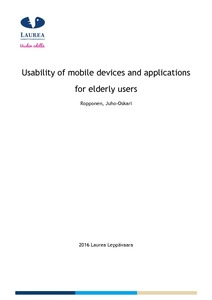Usability of mobile devices and applications for elderly users
Ropponen, Juho-Oskari (2016)
Lataukset:
Ropponen, Juho-Oskari
Laurea-ammattikorkeakoulu
2016
All rights reserved
Julkaisun pysyvä osoite on
https://urn.fi/URN:NBN:fi:amk-2016120919733
https://urn.fi/URN:NBN:fi:amk-2016120919733
Tiivistelmä
The number of mobile devices has increased rapidly during the last years and it is nearing the point where almost everyone owns and uses one. Also, the number of elderly people, more precisely over the age of 65, has increased rapidly and will continue rising in the near future.
The goal of this thesis was to find out if the overall usability of mobile devices and their applications is designed well enough for elderly users and their needs. The aim was to discover the characteristic issues in the design of mobile device interfaces for elderly users and find possible solutions to improve them.
The thesis consists of a theoretical framework and a research part. The theoretical framework based on related extant literature reveals important factors in interface usability as well as elements that should be taken into consideration in an interface designing process. In addition, literature related to elderly people and the issues emerging with aging were examined. This thesis fol-lows the case study technique. Interviews, observing users in action, field tests and project-related workshops were chosen as research methods.
Based on the results, it can be stated that many aging related factors affect usability of an interface and require special attention from the designers. Issues related to aging, such as vision, hearing, mental and physical abilities strongly affect the usability of a user interface.
It was discovered that many elements of an interface, which are obvious for younger users, require more polishing and clarity when made for elderly users. In addition, the aspects of experience and, through that, the view of life, should be thoroughly thought through.
The subject is important as the need for mobile devices and applications is constantly increasing. Mobile devices and applications can also offer plenty of assistance for elderly users in their normal routines if designed properly. Several studies have been conducted in relation to elderly users and their mobile device usability. Nevertheless, as the subject is challenging and technology is continuously improving, the topic should be continuously revisited. Therefore, the present study contributes to this literature stream by addressing it from the viewpoint of current technology and the needs of elderly users. In order to create and maintain pleasant usability for the elderly, several studies and hard work is required.
The goal of this thesis was to find out if the overall usability of mobile devices and their applications is designed well enough for elderly users and their needs. The aim was to discover the characteristic issues in the design of mobile device interfaces for elderly users and find possible solutions to improve them.
The thesis consists of a theoretical framework and a research part. The theoretical framework based on related extant literature reveals important factors in interface usability as well as elements that should be taken into consideration in an interface designing process. In addition, literature related to elderly people and the issues emerging with aging were examined. This thesis fol-lows the case study technique. Interviews, observing users in action, field tests and project-related workshops were chosen as research methods.
Based on the results, it can be stated that many aging related factors affect usability of an interface and require special attention from the designers. Issues related to aging, such as vision, hearing, mental and physical abilities strongly affect the usability of a user interface.
It was discovered that many elements of an interface, which are obvious for younger users, require more polishing and clarity when made for elderly users. In addition, the aspects of experience and, through that, the view of life, should be thoroughly thought through.
The subject is important as the need for mobile devices and applications is constantly increasing. Mobile devices and applications can also offer plenty of assistance for elderly users in their normal routines if designed properly. Several studies have been conducted in relation to elderly users and their mobile device usability. Nevertheless, as the subject is challenging and technology is continuously improving, the topic should be continuously revisited. Therefore, the present study contributes to this literature stream by addressing it from the viewpoint of current technology and the needs of elderly users. In order to create and maintain pleasant usability for the elderly, several studies and hard work is required.
